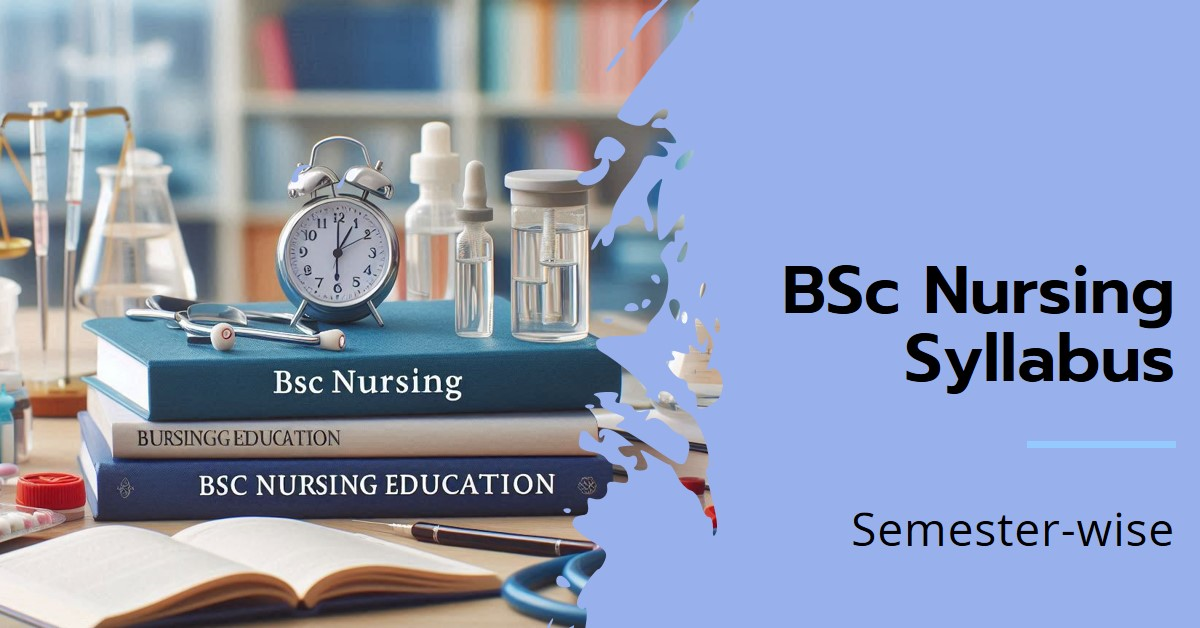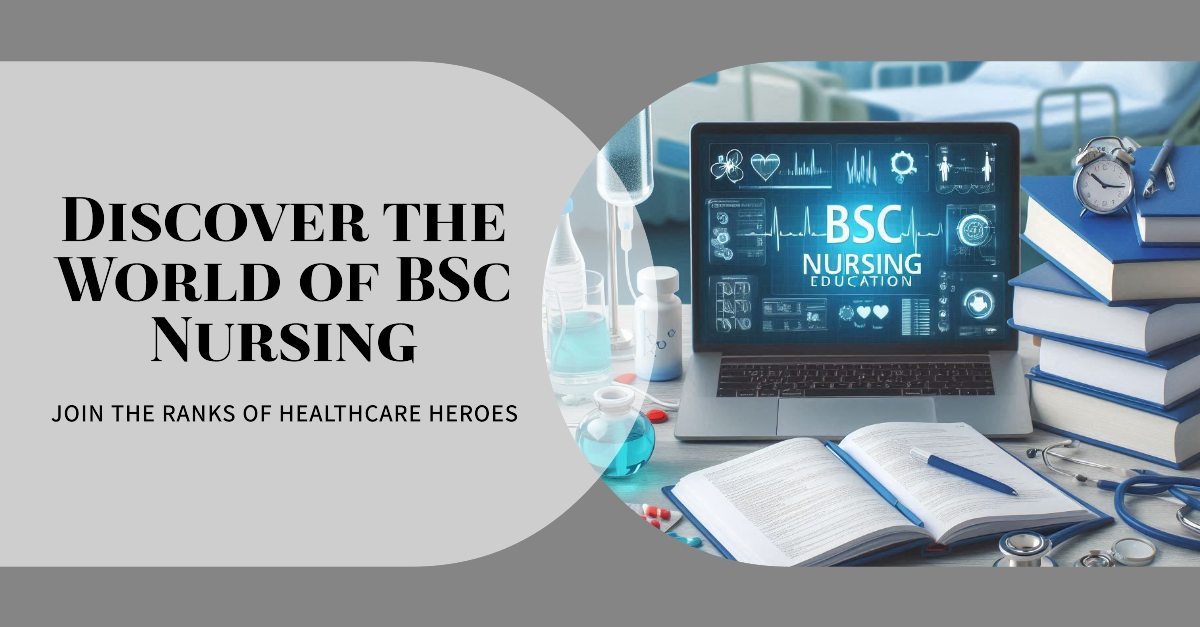The Bachelor of Science in Nursing (B.Sc. Nursing) is a four-year undergraduate program designed to provide students with comprehensive knowledge and skills essential for the nursing profession. this article provide BSc nursing syllabus semester wise.
Nursing is not only about patient care but also involves management, research, and community health. The curriculum is structured to ensure a balance between theoretical knowledge, practical training, and clinical exposure, enabling students to develop into competent healthcare professionals.
The course is divided into eight semesters over four years. Here’s a semester-wise breakdown of the BSc Nursing syllabus:
BSc Nursing Syllabus Semester I
1. Anatomy
- Overview: This subject provides students with an understanding of the structure and function of the human body. Students study different systems of the body, such as the skeletal, muscular, cardiovascular, and nervous systems.
- Key Topics:
- Introduction to Anatomical Terminologies
- Skeletal System and Joints
- Muscular System
- Cardiovascular System
- Nervous System
- Digestive and Respiratory Systems
2. Physiology
- Overview: Physiology deals with the normal functioning of various systems of the body. It helps students understand how the human body maintains homeostasis and responds to external stimuli.
- Key Topics:
- Cell Physiology
- Neurophysiology
- Blood and Immune System
- Respiratory and Digestive Systems
- Endocrine System
3. Biochemistry in BSc Nursing Syllabus
- Overview: This subject focuses on the chemical processes occurring within the human body, such as metabolism and enzyme functions. It lays the foundation for understanding the biochemical basis of diseases.
- Key Topics:
- Carbohydrates, Lipids, and Proteins
- Enzymes
- Acid-Base Balance
- Vitamins and Minerals
- Biochemical Role in Nutrition
4. Introduction to Nursing (Foundation of Nursing)
- Overview: This is the core nursing subject that introduces students to the principles and practices of nursing. It includes the history of nursing, ethics, and basic nursing procedures.
- Key Topics:
- Nursing as a Profession
- Nursing Ethics and Responsibilities
- Infection Control and Personal Hygiene
- Basic Nursing Care Techniques
5. Psychology
- Overview: Psychology helps students understand human behavior, which is essential for patient care and interaction. It covers theories of personality, behavior modification, and mental health.
- Key Topics:
- Psychological Theories
- Behavior and Motivation
- Mental Health and Illness
- Therapeutic Communication
6. Microbiology
- Overview: Microbiology introduces students to microorganisms, their role in causing diseases, and the body’s defense mechanisms. It also includes methods for preventing infections.
- Key Topics:
- Classification of Microorganisms
- Infection and Immunity
- Sterilization and Disinfection
- Bacterial, Viral, and Fungal Infections
BSc Nursing Syllabus Semester II
1. Sociology
- Overview: Sociology in nursing deals with the social aspects of healthcare and how societal factors affect health. It introduces students to social institutions, family dynamics, and healthcare delivery systems.
- Key Topics:
- Society and Culture
- Social Stratification and Class
- Family and Marriage
- Role of the Nurse in Society
2. Pharmacology
- Overview: Pharmacology is the study of drugs, their actions, and interactions in the human body. This subject equips students with knowledge about different medications and their effects.
- Key Topics:
- Introduction to Pharmacology
- Routes of Drug Administration
- Mechanisms of Drug Action
- Common Drugs and Their Uses
3. Pathology in BSc Nursing Syllabus
- Overview: Pathology focuses on the study of disease processes, helping students understand the nature and causes of diseases and how they affect different organs.
- Key Topics:
- Cellular Injury and Adaptation
- Inflammation and Repair
- Immune System Disorders
- Diseases of the Cardiovascular and Respiratory Systems
4. Medical-Surgical Nursing (Adult Health Nursing – I)
- Overview: Medical-Surgical Nursing is a core subject where students learn about nursing care in surgical and medical settings. This semester covers basic concepts in adult health.
- Key Topics:
- Nursing Care of Patients with Respiratory and Cardiovascular Disorders
- Pain Management
- Fluid and Electrolyte Imbalances
- Preoperative and Postoperative Care
5. Nutrition
- Overview: This subject teaches the principles of nutrition, including the role of nutrients in health and disease, and their relevance to nursing care.
- Key Topics:
- Nutrients and Their Functions
- Diet Planning for Various Age Groups
- Therapeutic Diets
- Malnutrition and Nutritional Deficiencies
BSc Nursing Syllabus Semester III
1. Medical-Surgical Nursing (Adult Health Nursing – II)
- Overview: This is a continuation of the medical-surgical nursing subject, focusing on advanced nursing care of adults with complex health conditions.
- Key Topics:
- Nursing Care of Patients with Neurological, Renal, and Endocrine Disorders
- Oncology Nursing
- Nursing Care for Patients with Infectious Diseases
- Emergency and Disaster Nursing
2. Community Health Nursing – I
- Overview: Community Health Nursing introduces students to healthcare at the community level, emphasizing public health, epidemiology, and preventive care.
- Key Topics:
- Concept of Health and Disease
- Epidemiology and Surveillance
- Health Promotion and Education
- Role of Community Health Nurses
3. Pharmacology (Advanced Concepts) in BSc Nursing Syllabus semester III
- Overview: This course continues from Semester II, covering more complex pharmacological concepts, including drug therapy for chronic and critical conditions.
- Key Topics:
- Drug Therapy for Cardiovascular, Respiratory, and Neurological Disorders
- Chemotherapy and Immunosuppressive Drugs
- Pediatric and Geriatric Pharmacology
4. Health Assessment
- Overview: Health Assessment teaches students the skills required for a comprehensive assessment of patients, including physical, emotional, and psychological evaluation.
- Key Topics:
- Patient Interview Techniques
- Physical Examination Skills
- Vital Signs and Health History
- Documentation and Reporting
BSc Nursing Syllabus Semester IV
1. Child Health Nursing (Pediatric Nursing)
- Overview: Pediatric Nursing focuses on the nursing care of infants, children, and adolescents, including both healthy and sick children.
- Key Topics:
- Growth and Development of Children
- Pediatric Nursing Procedures
- Nursing Care of Children with Common Childhood Diseases
- Immunization and Nutrition
2. Mental Health Nursing (Psychiatric Nursing)
- Overview: This subject introduces students to psychiatric nursing, covering mental disorders, therapeutic communication, and the role of nurses in mental healthcare.
- Key Topics:
- Mental Health and Mental Illness
- Psychiatric Disorders and Their Management
- Psychopharmacology
- Therapeutic Communication
3. Medical-Surgical Nursing (Adult Health Nursing – III)
- Overview: This continues the study of medical-surgical nursing, focusing on complex and critical care nursing for adults.
- Key Topics:
- Critical Care Nursing
- Nursing Care for Patients with Cardiac, Renal, and Respiratory Failure
- End-of-Life Care and Palliative Nursing
4. Community Health Nursing – II
- Overview: A continuation of Community Health Nursing, focusing on the role of nurses in managing public health programs and working with various population groups.
- Key Topics:
- Maternal and Child Health Services
- National Health Programs
- Occupational Health Nursing
- Disaster Management and Environmental Health
BSc Nursing Syllabus Semester V
1. Nursing Research and Statistics
- Overview: This subject introduces students to the principles of research methodology, statistical analysis, and the importance of evidence-based nursing practice.
- Key Topics:
- Research Methodology
- Data Collection and Analysis
- Writing Research Proposals and Reports
- Ethical Considerations in Research
2. Obstetric and Gynecological Nursing
- Overview: Obstetric Nursing deals with the nursing care of women during pregnancy, childbirth, and the postpartum period. It also includes gynecological nursing care.
- Key Topics:
- Antenatal, Intranatal, and Postnatal Care
- Common Gynaecological Disorders
- High-Risk Pregnancy
- Family Planning and Reproductive Health
3. Medical-Surgical Nursing (Adult Health Nursing – IV)
- Overview: This course covers specialized areas of medical-surgical nursing, such as advanced critical care, organ transplantation, and oncology nursing.
- Key Topics:
- Nursing Care for Patients with Transplantation
- Oncology Nursing
- Haematological Disorders
- Nursing Care for Patients with Multiple Organ Dysfunction
BSc Nursing Syllabus Semester VI
1. Leadership and Management in Nursing
- Overview: This subject focuses on the administrative aspects of nursing, teaching students leadership, management, and communication skills necessary for healthcare settings.
- Key Topics:
- Principles of Management
- Leadership Styles and Theories
- Human Resource Management in Nursing
- Quality Control in Nursing
2. Geriatric Nursing
- Overview: Geriatric Nursing addresses the special healthcare needs of the elderly population. It covers the physiological, psychological, and social aspects of aging, along with nursing care specific to older adults.
- Key Topics:
- Theories of Aging and Physiological Changes
- Common Geriatric Disorders (e.g., Dementia, Arthritis, Osteoporosis)
- Palliative and End-of-Life Care
- Nursing Interventions for Health Promotion in the Elderly
3. Rehabilitation Nursing
- Overview: Rehabilitation Nursing focuses on helping individuals with physical disabilities or chronic illnesses regain their independence and improve their quality of life.
- Key Topics:
- Principles of Rehabilitation
- Nursing Care for Patients with Stroke, Spinal Cord Injuries, and Amputations
- Community-Based Rehabilitation
- Psychosocial Aspects of Disability and Rehabilitation
4. Emergency and Disaster Nursing
- Overview: This subject equips students with the skills and knowledge to provide effective nursing care during emergencies and disasters. It involves triage management, critical thinking in high-pressure situations, and disaster preparedness.
- Key Topics:
- Principles of Emergency Nursing
- Disaster Management and Triage
- Nursing Care for Trauma Patients
- Crisis Intervention and Mass Casualty Incidents
BSc Nursing Syllabus Semester VII
1. Public Health Nursing
- Overview: Public Health Nursing is centered on improving the health of populations and communities through health promotion, disease prevention, and intervention strategies.
- Key Topics:
- Community Health Assessment
- Immunization Programs and Public Health Campaigns
- Role of Nurses in Epidemiological Studies
- Environmental and Occupational Health
2. Research Project in the BSc Nursing Syllabus
- Overview: This subject involves practical application of the research methodology learned in previous semesters. Students are expected to complete a research project, either individually or in groups, on a relevant nursing or healthcare topic.
- Key Topics:
- Identifying Research Problems in Nursing
- Literature Review and Hypothesis Formation
- Data Collection and Analysis Techniques
- Writing a Research Paper and Presentation Skills
3. Midwifery and Obstetrical Nursing
- Overview: Building upon the previous study of obstetric and gynaecological nursing, these subject focuses more on midwifery, neonatal care, and high-risk pregnancies.
- Key Topics:
- Care of Pregnant Women During Labor and Delivery
- Neonatal Nursing
- Complications During Labor (e.g., Preeclampsia, Gestational Diabetes)
- Ethical and Legal Aspects of Obstetric Nursing
4. Advanced Pharmacology
- Overview: In this course, students gain an in-depth understanding of drug therapies used in complex health conditions and chronic illnesses.
- Key Topics:
- Pharmacology in Critical Care and Emergency Settings
- Drug Interactions in Polypharmacy (common in older adults)
- Pain Management and Palliative Care Drugs
- Legal and Ethical Considerations in Pharmacological Care
BSc Nursing Syllabus Semester VIII
1. Community Health Nursing (Advanced Concepts)
- Overview: This course takes an advanced approach to community health, focusing on healthcare delivery systems, policies, and the role of nurses in community-based healthcare initiatives.
- Key Topics:
- Primary Healthcare and Health Systems
- Health Policy and Advocacy
- Nursing Roles in Disaster Relief
- International Health Programs
2. Management of Nursing Services and Education
- Overview: This subject focuses on administrative and teaching roles in nursing. It prepares students to take up leadership positions in healthcare settings or pursue a career in nursing education.
- Key Topics:
- Healthcare Leadership and Organizational Structure
- Budgeting, Staffing, and Resource Management
- Curriculum Development in Nursing Education
- Legal and Ethical Responsibilities in Nursing Administration
3. Nursing Informatics
- Overview: Nursing Informatics introduces students to the use of information technology in healthcare. It covers electronic health records (EHR), telemedicine, and the management of healthcare data.
- Key Topics:
- Introduction to Health Informatics and Its Application in Nursing
- Electronic Health Records and Data Privacy
- Telemedicine and Remote Patient Monitoring
- Trends and Innovations in Nursing Technology
4. Clinical Internship
- Overview: The clinical internship is a critical component of the B.Sc. Nursing program. In the final semester, students are required to complete a comprehensive clinical internship under the supervision of experienced nurses and healthcare professionals.
- Key Activities:
- Rotations in Various Departments (e.g., Medical-Surgical, Pediatrics, Psychiatry, Obstetrics)
- Real-Life Application of Nursing Skills and Knowledge
- Patient Care Management and Collaboration with Healthcare Teams
- Clinical Decision-Making and Critical Thinking Skills
Conclusion of the BSc Nursing Syllabus semester wise
The B.Sc. Nursing syllabus is meticulously designed to cover all aspects of nursing, from basic medical sciences to advanced nursing practices.
The four-year curriculum ensures a gradual and in-depth understanding of nursing roles in different settings, including hospitals, community health centers, and specialized care units.
With a focus on theory, practical skills, and clinical exposure, nursing students are well-equipped to provide quality care to patients and play a pivotal role in healthcare delivery systems.
Additionally, the emphasis on leadership, research, and community health ensures that graduates are not only skilled in bedside care but also prepared to take on broader roles such as nursing administration, education, and public health advocacy.
As healthcare continues to evolve, the B.Sc. Nursing program remains a comprehensive training ground for future nursing professionals.




